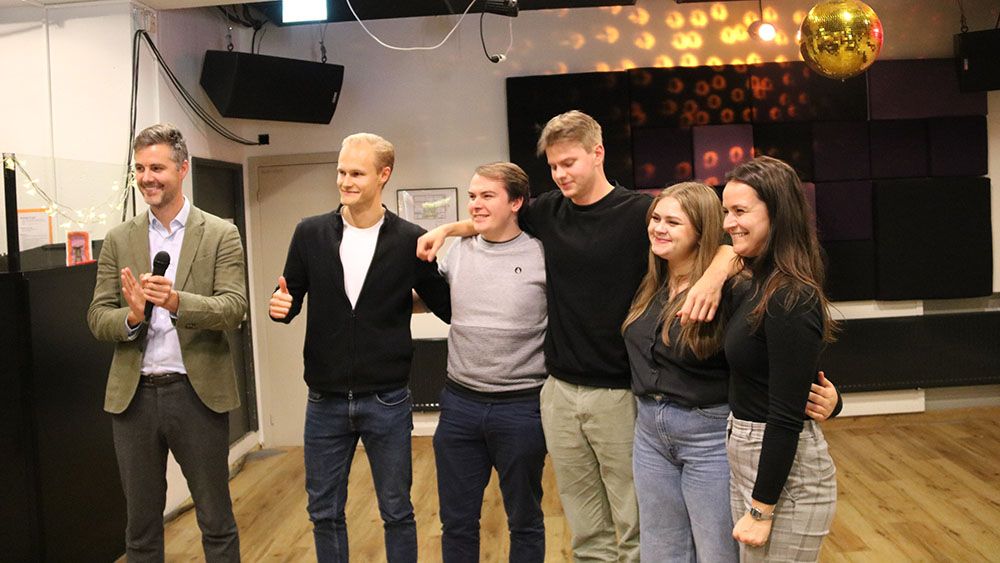For many of the students attending the course ‘Framing the environment in media and communication studies’, this autumn's case competition was also their exam.
Together with other participants in the Erasmus+ project Growth4SMEs from Belgium and Denmark, they presented solutions to a very relevant dilemma for the battery manufacturer ‘Vianode’.
The theme was ‘sustainability’ and the students could choose between solving a task where they had to figure out how they could make the battery manufacturer's strategy sustainable, or one deciding whether it was best to reuse or recycle batteries for electric cars.
After two days of intensive problem solving, the students presented their answer to a jury comprising the client, subject coordinator for the case competition Arnt Maasø, and jury member Eirik Welo.
The most favourable type of exam
“It was educational, fun and challenging. Best exam I've ever had anyway,” says Vegard Lie, a Bachelor's student in Media and Communication, and part of the group that came out on top in the case competition.
“Our solution was to think outside the box and both reuse and recycle the electric car batteries,” he concludes.
Although the students had little previous knowledge of battery production, they found it useful to be able to find and verify information.
“We did a thorough research job. We also helped each other and played to each other's strengths,” says Håkon Weider.
About the case-competition:
The case competition is part of the EU project Growth4SMEs, which aims to make it easier to get a job once students have completed their studies.
The project is a collaboration between University College Leuven-Limburg in Belgium, the University of Oslo in Norway, Aarhus municipality and Aarhus University in Denmark and is funded by Erasmus+.
The project maps the skills shortage in small and medium-sized companies in Europe and formulates requirements for graduates. In this way, the project seeks to fill the skills gap between companies and graduates.
Impressed the client and jury
This was the third time the case competition was held at The Faculty of Humanities, and the jury was impressed with the high quality of the solutions.
“It was very difficult to choose a winner this time since all the groups gave excellent presentations,” says Arnt Maasø, associate professor at the Department of Media and Communication.
Andreas Forfang at ‘Vianode’ believes that the students succeeded in identifying solutions that could be implemented in practice.
“The students presented a holistic perspective on sustainability and focused on what is possible within the economic system. There were good questions, quality presentations and great storytelling. They would really have fit in at Vianode,” Forfang thinks.
Knowledge from different areas is a strength
The course ‘Framing the environment in Media and Communication studies’ is part of an interdisciplinary grouping of courses awarding 40 grade points in environment and sustainability studies that Bachelor students can take, along side specialising in their main subject.
The students therefore come from a variety of academic backgrounds, including fields such as philosophy, media studies and languages. They viewed their diverse backgrounds as advantageous in the competition.
“Hopefully we can present solutions or ideas that the client has not previously thought of because we come from such different backgrounds and adopt a different approach to the problem,” says Maija-Reetta Malmberg, who is taking courses in Media and Communication at Aarhus University.
Work as in real life
For students on the ‘Framing the environment in media and communication studies’ course, solving problems for a real employer was a first-time experience.
“On the course we learned to critique firms and their sustainability reports, and that is easy. But now we’re on the other side, helping and providing ideas on how the company can achieve a sustainable strategy,” says Amelie Sofie Schneider.
“It's fun to do it in practice instead of just on a theoretical level. Working as a team, verbally presenting the solution and getting a chance to experience being part of a workforce is something we may need later,” adds Hannah Rødsten.
Varied ways of learning
Arnt Maasø hopes the case competition will continue even after the EU project Growth4SMEs project has concluded.
“Multiple ways of working and solving tasks are needed. I therefore believe that the University can get even better at varying its forms of assessment and ways of learning, so that we can also prepare the students for their future in the workplace,” he says.




